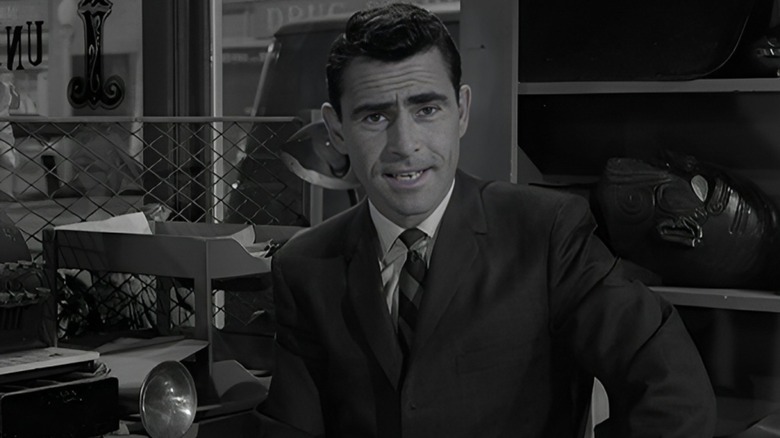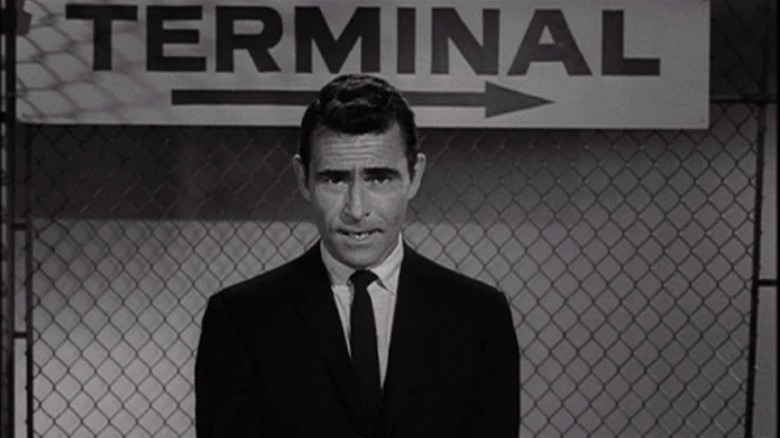Rod Serling Was Completely Unprepared For The Twilight Zone's First Emmy Win
When Rod Serling won an Emmy for "Outstanding Achievement in Drama" for "The Twilight Zone" in 1960, he was completely taken aback by this well-deserved win. Serling had previously earned several Emmy nominations for the show, having also won two Emmys for "Patterns" and "The Comedian" under the "Best Teleplay Writing" category. However, the writer-producer had good reason to believe that he would not be winning this particular award — he was up against the likes of James Costigan, and his adaptation of "The Turn of the Screw," alongside Loring Mandel, whose "Project Immortality" also emerged as a worthy contender. Costigan's adaptation was especially deemed deserving, as its screenplay was entirely built on visceral suspense, with a brilliant Ingrid Bergman belting out a chilling, memorable performance.
Per Marc Scott Zicree's "The Twilight Zone Companion," Serling was completely unprepared for the win, to the point that he didn't even bother shaving before the broadcast. Satisfied with being just another nominee clapping happily for his colleagues, Serling seemed delightfully surprised when his name was announced, walking with a sweetly awkward cadence as he accepted the award and delivered this succinct speech: "I don't know how deserving I am but I do know how grateful. Thank you so very much."
While Serling's win was a surprise for the screenwriter himself, it was completely deserved. Having worked on the majority of the episodes for "The Twilight Zone" while juggling the responsibility of opening and closing every entry with his signature brand of gripping narration, Serling had poured everything into creating a series that dipped its toes into the realm of otherworldly mysteries. Here's why "The Twilight Zone" still endures.
A beautiful labor of love
Serling's "The Twilight Zone" was not a run-of-the-mill anthology series that introduced twists for the sake of it — it ushered in an era of network television where everyday issues were molded into sharp allegories about the present and future. American screenwriter Vince Gilligan, who worked on prestigious shows such as "The X-Files" and "Breaking Bad," talked about Serling's unforgettable legacy and the absolute gift that "The Twilight Zone" was for the field of speculative fiction (via Cinephilia & Beyond):
"You want your work to be remembered. You want it to outlive you. My favorite show ever was 'The Twilight Zone' and I think about Rod Serling ... It long outlived him — he passed away in 1975 — but kids who haven't been born yet will know the phrase 'the twilight zone,' and hopefully will be watching those wonderful episodes."
Serling's passion for taking a stand against persistent social ills, such as the rampant rise of soulless capitalism and the use of war for political gains, was channeled into bite-sized episodes that never feel moralizing. From time to time, Serling injected comedy into his writing, leading to stories that leaned into humor while embracing the strange and the absurd. Many of the more serious episodes, such as "Where Is Everybody?" and "Nightmare at 20,000 Feet," deal with visceral human fears, and how they shape us as societies functioning under a system that is so acutely flawed and broken.
Serling went on to receive another Emmy for his writing for "The Twilight Zone" a year after his first win, and was posthumously inducted into the Television Hall of Fame in 1985. While many a screenwriter has been influenced and shaped by Serling's show since then, "The Twilight Zone" still endures, years after its final episode aired on June 19, 1964.

